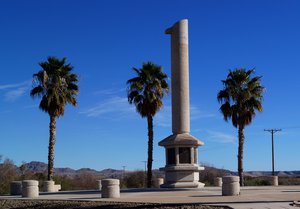Advertisement
Published: February 23rd 2015

 POSTEN
POSTEN
A few years back the the CRIT tribal council allowed some disgruntled Japs to build a monument to the concentration camps at Posten. The whole WRA is disgrace that should not be forgotten or ever allowed to happen again, although we have come pretty close with the Patriot Act and the terrorist prison in Cuba.After the skulking Japs launched their dastardly sneak attack on Pearl Harbor nobody in America was willing to trust any other Japs. We had about 120 thousand Jap citizens who proclaimed they were peaceable and loyal and most of them probably were. An Allied victory in WWII was far from a certainty at the beginning of our involvement in the war. We were not ready to go to war, Europe and Russia were dangerously close to falling to the Nazis, and the Japs held the entire Pacific and China. If we lost the war our peaceable and loyal Jap citizens would have quickly returned their allegiance to the Jap Empire. In the meantime Jap citizens were a problem that our political leadership did not have the time or the inclination to deal with. Our political response was the War Relocation Authority. It allowed us to hold our Jap citizens in concentration camps. Ten camps were built as cheaply and quickly as they could be thrown together. Many of the camps were built on Indian land, which was still thought to be public land controlled by the Bureau of Indian Affairs. The largest camp by a long shot was built at Posten, Arizona by Del Webb on land belonging to the Colorado River Indian Tribes (CRIT). The tribal council was in bitter opposition to the use of their land for the purpose of detaining other people. The council was loudly shouted down by government hacks who argued that the farms and improvements would remain on their land after the war ended, that improvements would be made by slave labor, and that the camps were to be funded out of Department of Defense revenues so that the whole thing would not cost a dime. During the war nearly 18 thousand Japs were detained at Posten in three separate camps that came to be known locally as Roasten, Toasten, and Dusten. After the war ended we let the Japs loose and restored their civil rights, but not their personal property that had been confiscated or stolen by neighbors at tax sales. In the intervening years it has come to ruffle our national conscience that we deprived the Japs of due process, which we undeniably did, but it kept them from being slaughtered in the streets. In retrospect we perhaps should have allowed them that option; shame on us that we didn’t.
Advertisement
Tot: 0.21s; Tpl: 0.01s; cc: 10; qc: 31; dbt: 0.1715s; 1; m:domysql w:travelblog (10.17.0.13); sld: 1;
; mem: 1mb

 POSTEN
POSTEN